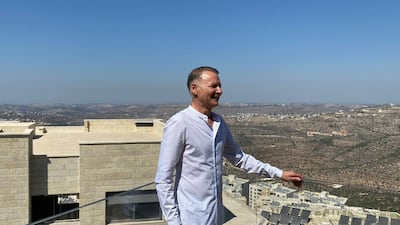A top Palestinian business executive said his people must find positives in recent agreements between Gulf Arab states to normalise ties with Israel and pressure it to halt settlement building.
Bashar Masri, who runs two of the Palestinians' largest holding companies, said that they must find a way to turn the agreements into "a positive thing for us".
The move by the UAE and Bahrain last month was hailed by international figures as a means to promote peace and stability in the region, and boost the long-stalled Palestinian-Israel peace process.
But leaders of the Palestinian Authority and Hamas have called the agreements to normalise relations with Israel a blow to their quest for an independent state in the West Bank, Gaza and East Jerusalem, territory captured in the1967 war.
Under the US-brokered diplomatic push, Israel agreed to suspend plans to annex parts of the occupied West Bank.
Mr Masri, 59, told Reuters that the Palestinian message to the UAE and Bahrain should now be to pressure Israel into halting settlements and working towards peace.
"I hope they can turn these agreements to pressure Israel into concessions for the Palestinians," he said.
Mr Masri, the Palestinian-American chairman of Massar International, said he was uncertain that halting settlement expansion in the West Bank would be a first priority.
Most countries consider settlements Israel has built on occupied land as illegal under international law, but Israel disputes this.
Israel has praised ties with the UAE and Bahrain as a major business opportunity, and Mr Masri said Palestinian enterprises would not be inherently opposed to accepting investment from the two Gulf nations.
Massar International oversees and manages more than 30 subsidiaries and investments in finance, technology, agriculture, media and real estate, including Rawabi, the first planned Palestinian city in the West Bank.
He said now that emotions over the deals had calmed down, Palestinians had "no choice but to be optimistic".
"Our enemies want us to give up hope. If we give up hope, they have exactly what they want and there will be no Palestine, and no Palestinian people," Mr Masri said.
Meanwhile, former Saudi intelligence chief Prince Bandar bin Sultan hit out at criticism of the deal by Palestinian leaders.
"This low level of discourse is not what we expect from officials who seek to gain global support for their cause," Prince Bandar told Al Arabiya on Monday.
"The Palestinian cause is a just cause but its advocates are failures, and the Israeli cause is unjust but its advocates have proven to be successful. That sums up the events of the last 70 or 75 years.
"There is something that successive Palestinian leadership historically share in common: they always bet on the losing side and that comes at a price."
Saudi Arabia has not officially commented on last month’s deals, but says it remains committed to peace on the basis of the Arab Peace Initiative.
Prince Bandar spoke of the decades-long support of Saudi kings to the Palestinian cause.
He said the Palestinian people should remember that the kingdom has always been there for them to offer help and advice.
- Additional reporting by agencies


